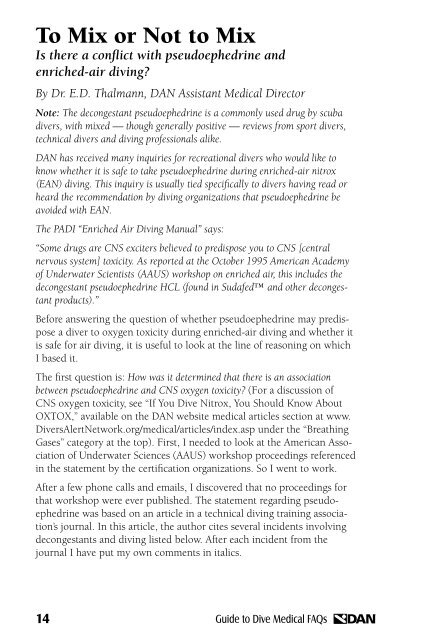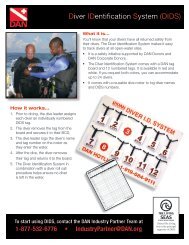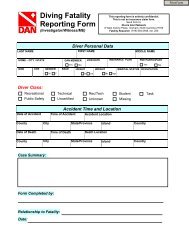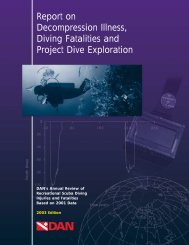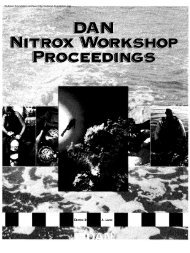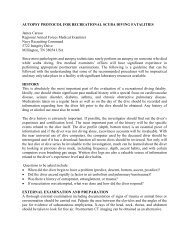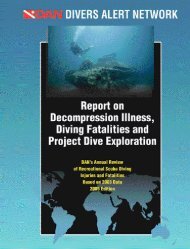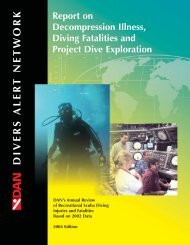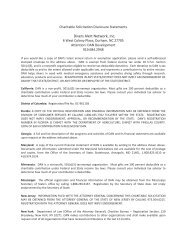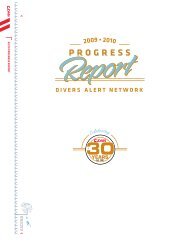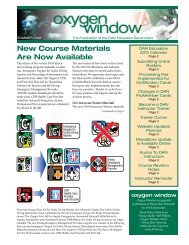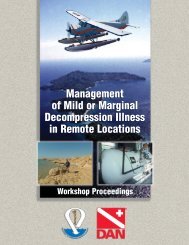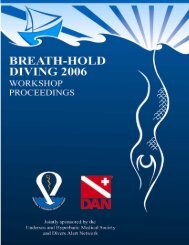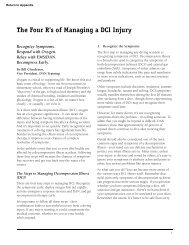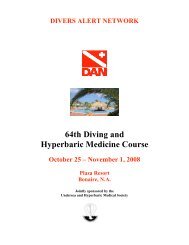You also want an ePaper? Increase the reach of your titles
YUMPU automatically turns print PDFs into web optimized ePapers that Google loves.
To Mix or Not to Mix<br />
Is there a conflict with pseudoephedrine and<br />
enriched-air diving?<br />
By Dr. E.D. Thalmann, DAN Assistant Medical Director<br />
Note: The decongestant pseudoephedrine is a commonly used drug by scuba<br />
divers, with mixed — though generally positive — reviews from sport divers,<br />
technical divers and diving professionals alike.<br />
DAN has received many inquiries for recreational divers who would like to<br />
know whether it is safe to take pseudoephedrine during enriched-air nitrox<br />
(EAN) diving. This inquiry is usually tied specifically to divers having read or<br />
heard the recommendation by diving organizations that pseudoephedrine be<br />
avoided with EAN.<br />
The PADI “Enriched Air Diving Manual” says:<br />
“Some drugs are CNS exciters believed to predispose you to CNS [central<br />
nervous system] toxicity. As reported at the October 1995 American Academy<br />
of Underwater Scientists (AAUS) workshop on enriched air, this includes the<br />
decongestant pseudoephedrine HCL (found in Sudafed and other decongestant<br />
products).”<br />
Before answering the question of whether pseudoephedrine may predispose<br />
a diver to oxygen toxicity during enriched-air diving and whether it<br />
is safe for air diving, it is useful to look at the line of reasoning on which<br />
I based it.<br />
The first question is: How was it determined that there is an association<br />
between pseudoephedrine and CNS oxygen toxicity? (For a discussion of<br />
CNS oxygen toxicity, see “If You Dive Nitrox, You Should Know About<br />
OXTOX,” available on the DAN website medical articles section at www.<br />
<strong>Divers</strong><strong>Alert</strong><strong>Network</strong>.org/medical/articles/index.asp under the “Breathing<br />
Gases” category at the top). First, I needed to look at the American Association<br />
of Underwater Sciences (AAUS) workshop proceedings referenced<br />
in the statement by the certification organizations. So I went to work.<br />
After a few phone calls and emails, I discovered that no proceedings for<br />
that workshop were ever published. The statement regarding pseudoephedrine<br />
was based on an article in a technical diving training association’s<br />
journal. In this article, the author cites several incidents involving<br />
decongestants and diving listed below. After each incident from the<br />
journal I have put my own comments in italics.<br />
14 Guide to Dive Medical FAQs


